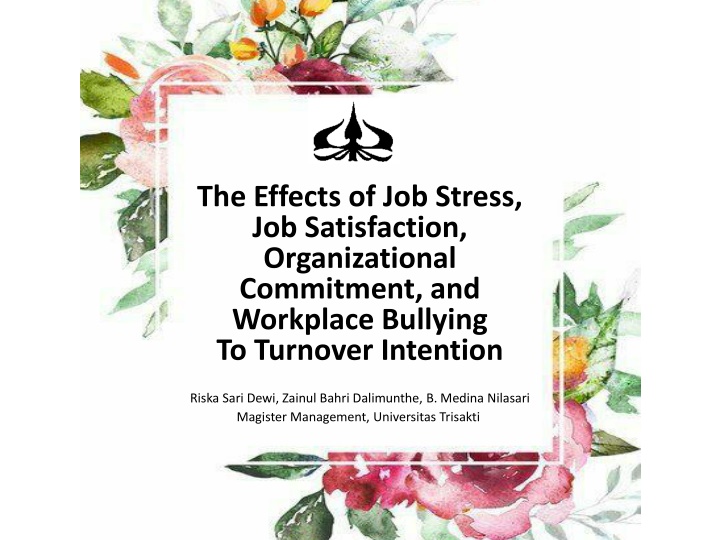Effects of Job Stress, Job Satisfaction, Organizational Commitment, and Workplace Bullying on Turnover Intention
The research examines the impact of job stress, job satisfaction, organizational commitment, and workplace bullying on turnover intention in a competitive insurance company. High turnover rates can hinder organizational performance and goal achievement. Preliminary survey data at PT Prudential (2017) indicates a correlation between these factors and turnover intention. The theoretical framework discusses the psychological implications of stress, job satisfaction, organizational commitment, and workplace bullying on employee behavior. The study aims to establish significant effects on turnover intention based on job-related factors.
Download Presentation

Please find below an Image/Link to download the presentation.
The content on the website is provided AS IS for your information and personal use only. It may not be sold, licensed, or shared on other websites without obtaining consent from the author.If you encounter any issues during the download, it is possible that the publisher has removed the file from their server.
You are allowed to download the files provided on this website for personal or commercial use, subject to the condition that they are used lawfully. All files are the property of their respective owners.
The content on the website is provided AS IS for your information and personal use only. It may not be sold, licensed, or shared on other websites without obtaining consent from the author.
E N D
Presentation Transcript
The Effects of Job Stress, Job Satisfaction, Organizational Commitment, and Workplace Bullying To Turnover Intention Riska Sari Dewi, Zainul Bahri Dalimunthe, B. Medina Nilasari Magister Management, Universitas Trisakti
INTRODUCTION The inability to manage human resources will have a direct or indirect impact on the organization. One form of employee management inability has an impact on the behavior of employees who tend to move and lead to the employee's decision to leave their job. The problem that occurs today in PT. Prudential which is one of the many companies engaged in insurance services that is very competitive in the country, is that there is a high turnover that will decrease the company's performance to achieve the desired goals effectively and efficiently. Turnover that continues to increase will have an impact on the intention to change jobs to other employees in the company. To determine whether there is turnover intention, we distributed an initial questionnaire to several employees with 3 questions.
Table 1 Initial Survey Result Data of Turnover Intention Length of work have you worked in this company? How long Do you feel happy working in this company? YES NO 14 21 6 2 Have you ever intended to leave the company? YES NO 25 14 No 1. 2. <1 thn 1 4 thn 22 21 2 3 3. > 4 thn Total : 14 57 10 4 30 27 2 41 16 11 Source: Preliminary Results Survey at PT. Prudential (2017) Research questions: Is there an effect of job stress, job satisfaction, organizational commitment, and workplace bullying on turnover intention?
THEORITICAL FRAMEWORK 1. Stress is connected to certain psychological issues, for example problems such as anxiety, low self-esteem and motivation, mood variations. This consequence will reduce performance, job satisfaction and increase turnover intention without considering gender (Khan, Aqeel & Riaz, 2014). . Robbins and Judge (2011) define job satisfaction as a positive feeling about work as a result of evaluating its characteristics. Study of Muller (2003) show that job satisfaction is closely related to the process of withdrawal cognition, the intention to leave and the real action in the form of turnover. Lumley, et.al. (2011), organizational commitment is seen as an individual psychological relationship with the organization and is characterized by a strong identification with the organization and a desire to contribute to the fulfillment of organizational goals. According to Rai & Agarwal (2016) workplace bullying is a situation where a person is repeatedly and during a period of time exposed to negative actions from colleagues, superiors or subordinates. At the organizational level, it negatively affects employee commitment, job satisfaction, absenteeism and turnover intention (Mete & S kmen, 2016). 2. 3. 4.
Figure 1 Conceptual Framework Hypothesis: H1: Job stress has a significant effect on turnover intention. H2: Job satisfaction has a significant effect on turnover intention H3: Organizational commitment has a significant effect on turnover intention H4: Workplace bullying has a significant effect on turnover intention.
METHODS The variables & measurements used in this study are as follows: (1) Job stress as an independent variable: role ambiguity, role conflict, role overload. (2) The job satisfaction as an independent variable: work it self, present pay, promotion, supervision, co- worker. (3) The organizational commitment as an independent variable: affective commitment, continuance commitment, normative commitment. (4) Workplace bullying as an independent variable: (a) Pressure from other people to do work below the level of competence. (b) Insulted or given offensive comments about you. (c) Being treated in a disrespectful and rude manner. (d) Being humiliated or ridiculed in connection with your work. (5) Turnover intention as the dependent: thought of leaving, looking for new jobs , accepting chances. Measured using a Likert scale with 4 levels of answers as follows: Strongly Agree with a score of 4; Agree with a score of 3; Disagree with a score of 2; Strongly Disagree with a score of 1. Samples are Sales Agent employees of PT. Prudential. The total population used was 147 people. The number of samples was 107 people (using Slovin formula). The questionnaire data returned were 102 with a response rate of 90%. The sampling technique is probability sampling technique. The data analysis method used is simple regression analysis to see the effect of job stress (X1), job satisfaction (X2), organizational commitment (X3), workplace bullying (X4) on turnover intention (Y), and to find out whether there is a joint influence between the existing independent variables on the dependent variable, multiple regression analysis is used.
RESULT Table 3 Table 2 Overall Hypothesis Testing (F test) Partial Hypothesis Testing (t test) T test df T table Sig F value Df F table Sig Conclusion Conclusion Ho is rejected 30.519 df1 = 4 2.465 0,000 Sig Ho is rejected X1 2.414 97 1.985 0 Sig Ho is rejected X2 -2.899 97 1.985 0.0018 Sig Ho is rejected X3 -4.401 97 1.985 0.005 Sig Ho is rejected X4 5.080 97 1.985 0 Sig 0.001
CONCLUSION 1. This study was conducted to analyze job stress variables, job satisfaction, organizational commitment, workplace bullying and turnover intention among employees of PT. Prudential. Job stress partially has a significant effect on turnover intention with R square by 24.4%. Job satisfaction partially has a significant effect on turnover intention with R square by 19.1%. Organizational commitment partially has a significant effect on turnover intention with R square by 35.1%. Workplace Bullying partially has a significant effect on turnover intention with R square by 18.7%. Job stress (X1), job satisfaction (X2), organizational commitment (X3), and workplace bullying (X4) simultaneously have a significant effect on turnover intention (Y) with R square 55.7% for PT.Prudential employees. This can be interpreted in the research that partially has a low effect, and simultaneously has a greater influence than partially. 2. 3. 4. 5.
Thanks! Thanks!























